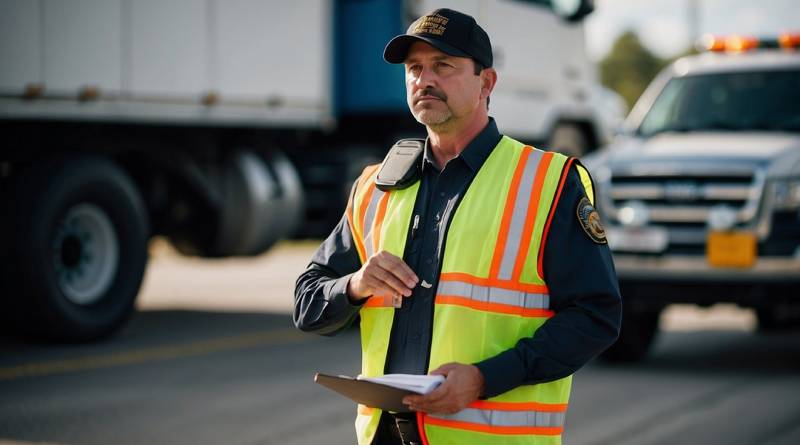The Federal Motor Carrier Safety Regulations (FMCSRs) are standards set forth by the United States Department of Transportation (DOT) to ensure safety in the operation of commercial motor vehicles (CMVs). The FMCSRs cover a wide range of safety issues, including driver qualifications, vehicle condition, driving hours, maintenance requirements, and cargo securement. These regulations apply to interstate commercial trucking and bus operations, and their enforcement plays a critical role in reducing the number of accidents, injuries, and fatalities associated with commercial vehicles on the nation’s highways.

The FMCSRs are enforced by the Federal Motor Carrier Safety Administration (FMCSA), an agency within the DOT. The FMCSA’s primary mission is to prevent commercial motor vehicle-related fatalities and injuries. It accomplishes this through the enforcement of the FMCSRs, which involves roadside inspections, compliance reviews, audits, and educational programs. Carriers who fail to comply with the FMCSRs may face penalties, including fines and out-of-service orders.
Adherence to the FMCSRs is essential for commercial motor carriers, as violations can result in severe consequences. The regulations are detailed and comprehensive, requiring carriers to maintain a high level of vigilance in their operations. The DOT consistently updates the FMCSRs to respond to emerging safety concerns and advancements in vehicle technology. These updates ensure that the FMCSRs remain current and effective in promoting road safety and protecting the public from the inherent risks associated with commercial motor vehicle traffic.
Table of Contents
Overview of FMCSRs
Federal Motor Carrier Safety Regulations (FMCSRs) are critical guidelines enforced by the Department of Transportation to ensure safety in the motor carrier industry.
Purpose and Scope
The FMCSRs serve to enhance the safety of commercial motor vehicle (CMV) operations and to protect the public on the roadways. They apply to drivers, employers, and employees associated with commercial motor vehicles in interstate commerce, and they cover a range of categories, from driver qualifications to vehicle maintenance.
Critical Regulations
The FMCSRs encompass numerous regulations. Here are some key areas:
- Driver Qualifications:
- Commercial Driver’s License (CDL) requirements
- Medical certificates
- Hours of Service (HOS):
- Maximum driving hours
- Required rest periods
- Vehicle Maintenance:
- Regular inspection schedules
- Repair standards
- Safety and Fitness Procedures:
- Monitoring and reporting safety performance
- Compliance reviews
- Hazardous Materials (HazMat):
- Transportation and handling requirements
- Training for HazMat employees
Entities like Simplex Hub, involved in the FMCSA compliance process, must adhere to these regulations to ensure the safety of their operations and to avoid penalties.
Compliance and Enforcement
Ensuring adherence to the Federal Motor Carrier Safety Regulations (FMCSRs) is critical for the safety of the roadways. Both routine checks and targeted investigations are part of the compliance process.
Inspection Procedures
- Pre-Trip Inspections: Drivers are required to perform thorough checks before each trip, ensuring that their vehicle meets safety standards.
- Roadside Inspections: Conducted by state and federal inspectors, these spot checks can happen during a journey to assess a vehicle’s compliance with FMCSRs.
- Compliance Reviews: Companies may undergo evaluations that examine records and practices in detail to verify adherence to regulatory requirements.
Penalties and Consequences
- Violations: Non-compliance can result in various penalties, ranging from fines to out-of-service orders depending on the severity of the violation.
- Fines: The Federal Motor Carrier Safety Administration (FMCSA) outlines a fine schedule for violations, which can be escalated for repeat offenses.
- Out-of-Service Orders: Severe or persistent breaches may lead to a temporary shutdown of the carrier’s operation until they come into compliance.
- CDL Suspensions: Drivers may face suspension of their commercial driver’s license for serious infractions or multiple minor breaches.
Safety Standards and Requirements
The Federal Motor Carrier Safety Regulations (FMCSRs) enforced by the Department of Transportation (DOT) set forth a variety of safety standards and requirements aimed at ensuring the safe operation of commercial motor vehicles. These regulations apply to vehicle maintenance, driver qualifications, and hours of service, which are critical for preventing roadway accidents and promoting safe driving practices.
Vehicle Maintenance
Commercial motor vehicles must be routinely inspected, maintained, and repaired to comply with specific safety standards. Critical vehicle systems such as brakes, steering, lighting, and tires must meet the minimum requirements to ensure they function properly during operation.
- Brake Systems: Must be regularly inspected and maintained to prevent failure.
- Steering Mechanisms: Should be free of excessive play and maintain correct alignment.
- Lighting: All signals, lamps, and reflectors must operate correctly to ensure visibility.
- Tires: Should be checked for adequate tread depth and be free of major damage to sustain vehicle control.
Driver Qualifications
Drivers of commercial vehicles are required to meet stringent qualification standards that include specific licensing, medical fitness, and training.
- Commercial Driver’s License (CDL): Drivers must possess a valid CDL appropriate for the vehicle class they operate.
- Medical Examination: They must pass a DOT physical examination and carry a medical certificate.
- Training: Proper training on vehicle operation, safety procedures, and applicable regulations is mandatory.
Hours of Service Rules
Hours of service regulations are fundamental to managing driver fatigue, which is a significant contributor to road accidents.
- Daily Driving Limit: Drivers may drive a maximum of 11 hours after 10 consecutive hours off duty.
- Weekly Working Hours: Commercial drivers are limited to 60/70 hours on duty over 7/8 consecutive days, respectively.
- Mandatory Breaks: Drivers must take a 30-minute break after 8 cumulative hours of driving.
These rules are enforced through the use of electronic logging devices or paper logbooks to accurately record hours of service, with companies like Simplex Hub offering solutions to maintain compliance.
DOT’s Role in FMCSR Enforcement
The Department of Transportation (DOT) enforces Federal Motor Carrier Safety Regulations (FMCSRs) to ensure the safe operation of commercial motor vehicles. They utilize a combination of monitoring efforts and educational resources to uphold these standards.
Monitoring and Reporting
The DOT conducts inspections and audits to monitor compliance with FMCSRs. They employ a variety of methods, including:
- Roadside Inspections: Conducted by certified safety inspectors to assess vehicle conditions and driver requirements.
- Compliance Reviews: On-site examinations of motor carrier operations, such as driver logs, equipment, and cargo.
- Data Analysis: Utilization of databases, such as the Safety Measurement System (SMS), to identify carriers with safety performance issues.
Violations found during these activities can result in fines, penalties, or out-of-service orders for carriers, drivers, or vehicles.
Education and Resources
To support compliance, the DOT provides education and resources to carriers and drivers. These include:
- Safety Programs: Initiatives like the Compliance, Safety, Accountability (CSA) program which helps identify carriers’ safety problems.
- Training Materials: Guides, webinars, and online courses to inform about regulations and best practices.
- Outreach Events: Workshops and seminars held nationwide to directly engage with the transportation industry.


